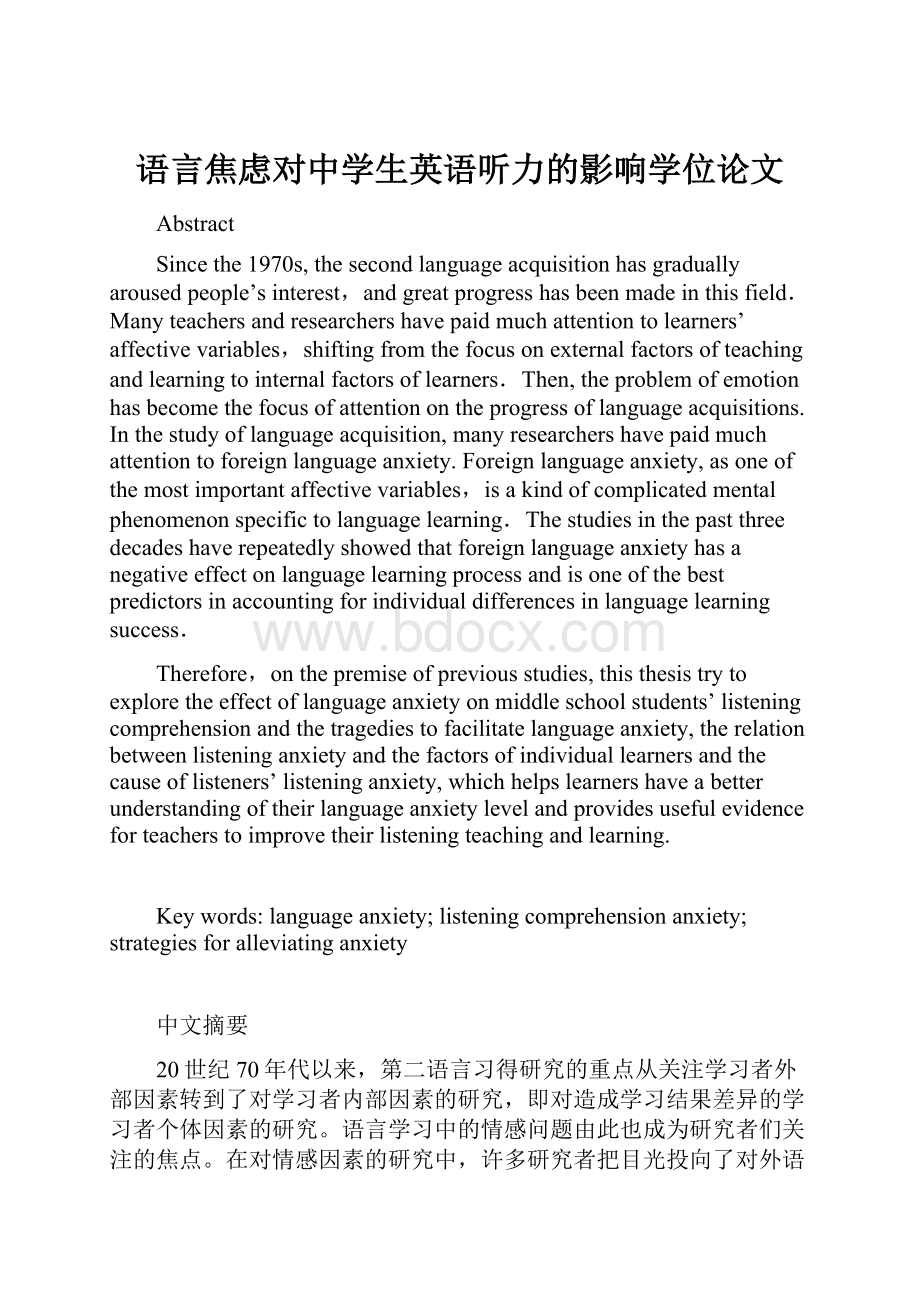语言焦虑对中学生英语听力的影响学位论文.docx
《语言焦虑对中学生英语听力的影响学位论文.docx》由会员分享,可在线阅读,更多相关《语言焦虑对中学生英语听力的影响学位论文.docx(22页珍藏版)》请在冰豆网上搜索。

语言焦虑对中学生英语听力的影响学位论文
Abstract
Sincethe1970s,thesecondlanguageacquisitionhasgraduallyarousedpeople’sinterest,andgreatprogresshasbeenmadeinthisfield.Manyteachersandresearchershavepaidmuchattentiontolearners’affectivevariables,shiftingfromthefocusonexternalfactorsofteachingandlearningtointernalfactorsoflearners.Then,theproblemofemotionhasbecomethefocusofattentionontheprogressoflanguageacquisitions.Inthestudyoflanguageacquisition,manyresearchershavepaidmuchattentiontoforeignlanguageanxiety.Foreignlanguageanxiety,asoneofthemostimportantaffectivevariables,isakindofcomplicatedmentalphenomenonspecifictolanguagelearning.Thestudiesinthepastthreedecadeshaverepeatedlyshowedthatforeignlanguageanxietyhasanegativeeffectonlanguagelearningprocessandisoneofthebestpredictorsinaccountingforindividualdifferencesinlanguagelearningsuccess.
Therefore,onthepremiseofpreviousstudies,thisthesistrytoexploretheeffectoflanguageanxietyonmiddleschoolstudents’listeningcomprehensionandthetragediestofacilitatelanguageanxiety,therelationbetweenlisteninganxietyandthefactorsofindividuallearnersandthecauseoflisteners’listeninganxiety,whichhelpslearnershaveabetterunderstandingoftheirlanguageanxietylevelandprovidesusefulevidenceforteacherstoimprovetheirlisteningteachingandlearning.
Keywords:
languageanxiety;listeningcomprehensionanxiety;strategiesforalleviatinganxiety
中文摘要
20世纪70年代以来,第二语言习得研究的重点从关注学习者外部因素转到了对学习者内部因素的研究,即对造成学习结果差异的学习者个体因素的研究。
语言学习中的情感问题由此也成为研究者们关注的焦点。
在对情感因素的研究中,许多研究者把目光投向了对外语学习焦虑情绪的研究。
外语学习焦虑是在语言学习过程中产生的一种显著的自我意识,信念和情感情结,是与外语语境有着特殊关系的紧张和畏惧感觉。
国外30年的研究结果表明:
语言焦虑时预测学习者学习成败与否的关键因素之一;焦虑与学习者的成绩呈一定负相关。
因此,在吸取前人研究成果的前提下,本文尝试分析初中生英语学习者的听力焦虑情绪对听力理解的影响,以及焦虑情绪在不同性别,学习英语时间长短是否有差别也做了探讨;通过对听力焦虑问卷以及课堂焦虑问卷的形式,进一步探讨语言焦虑对听力的影响和消除焦虑的方法。
关键词:
语言焦虑;听力焦虑;解决方法
ChapterOneIntroduction
1.1Introduction
LanguageanxietyanditseffectonEnglishlearninghavebeenahottopicworthpeople’sattention.Reviewingsomeresearchers’studies,wecanfindthattheymainlyfocusonthefollowingtopics:
thedefinitionandcharacteristicsoflanguageanxiety,theeffectoflanguageanxietyonlanguageproficiency,theeffectoflanguageanxietyonthestudyofsinglelanguageintroduction,suchastheeffectonoralEnglishandtheeffectoflanguageanxietyonwriting,andsoon.Manypeopledonotconsiderthatreadingcomprehensionassociateswithlanguage,however,theresearchersclaimthatthelanguageanxietywillcomeifoneisnotfamiliarwiththematerialsorculture,whichwillinfluencethescore.Notmanyresearchersstudyonthecorrelationbetweenlanguageanxietyandlisteningproficiency,nottomentionthearticlesaboutit.Krashen(1992)suggestedthatlanguageanxietywillcomeeasilyintheprogressoflisteningcomprehensionandnotmanystudiesshowedthatlanguageanxietyactuallyinfluencelearners’listening.
Thepurposeofthepresentstudyistofindoutthecorrelationbetweenlanguageanxietyandlisteninganxietyandhowtheyinfluencelearners’listeningproficiency.Itishopedthattheresultofthepresentstudycanprovideinsightsandguidanceforteachingandlearning.
Thisdissertationconsistsoffivechapters.ChapterOneintroducestheresearchtopic.ChapterTworeviewsthetheoryoflisteningcomprehensionandlanguageanxiety;itscause;embodimentaswellastheeffectonlearning.ChapterThreethenfocusesonthemethodologyofthestudyanddisplaystheresearchquestions,subjects,proceduresandinstruments.ChapterFourdemonstratestheresultsoftheanalysisofcollecteddata.ChapterFivefurtherdiscussesinmoredepththeresultspresentedintheprecedingchapterandconcludesomestrategiesforalleviatinglanguageanxietyandthelimitationsofthepresentstudyandthesuggestionsonfurtherresearch.
ChapterTwoLiteratureReview
2.1Itroduction
Abriefintroductionhasbeenpresentedintheprecedingsection.Accordingtothearrangementofthethesis,thischapterwillgivealiteraturereviewofthetopicsconcerned,whichincludesthedefinitionandclassificationoflisteningcomprehension,studiesonforeignlanguageanxiety.ContributionsandshortcomingsofthepreviousfindingswillbereviewedsoastogiveageneralpictureofFLLASstudiesinthesecondlanguageacquisitionresearcharea.
LC:
listeningcomprehension
FLLAS:
foreignlanguagelisteninganxietyscale
FLCAS:
foreignlanguageclassroomanxietyscale
2.2.ListeningComprehension
2.2.1DefinitionofListeningComprehension
AccordingtoLongmanDictionaryofLanguageTeachingandAppliedLinguistics(2000:
269),listeningcomprehension(LC)means“theprocessofunderstandingspeechinasecondorforeignlanguage.AccordingtoDaiJunreng,LCrefersto“theactivityofhumanbrainprocessingtheinformationheardconsciouslyandactively”(1998,quotedfromYahJm,2000:
54).AndLarryVandergrifl(1999)viewedthat“listeningisanactiveandcomplexprocessinwhichthelistenermustdiscriminatebetweensounds,understandvocabularyandgrammaticalstructures,interpretstressandintonation,retainwhatisgatheredinalloftheabove,andexplainitwithinthelimmitedtimeaswellasthelargersocio-culturalcontextoftheutterance”.O'MalleyandChamot(1989)defineditasthefollowings:
“Listeningcomprehensionisviewedtheoreticallyasanactiveprocessinwhichindividualsfocusonselectedaspectsofauralinput,constructmeaningfrompassages,andrelatewhatisheardtoexistingknowledge”.Allthedefinitionsabovehaveonethingincommonthatlisteningcomprehensionisanactiveprocessthatdemandsthelistener’sfullinvolvement.
2.2.2TheClassificationofListeningComprehension
(i)IntensiveListening
Intensivelisteningisalisteningpracticewhichrequiresstudentstounderstandeverywordandtheexactmeaningofthearticlewithnomissingwordsanduncertaintyofthemeaning.
(ii)ExtensiveListening
Comparedwithintensivelistening,extensivelisteningisrelativelyeasier,whichonlyaimsatunderstandingthegeneralmeaningofthewholearticle.Losingaword,aphraseorevenasentenceisacceptableonlyifitdoesnotinfluencethecomprehensionofthetext.
(iii)TheCombinationofIntensiveListeningandExtensiveListening
ItisveryimportantforpeopletolearnEnglishwell,notonlyimprovingtheleveloflisteningcomprehensionbutalsoenablingstudentstolearnmoreaboutlexisandgrammar.IntensivelisteningexercisedemandsstudentstohaveagoodgraspatthefoundationofEnglishandtobeperseveringinlearningit.Whileextensivelisteningexercise,whichhelpsstudentsmeettherequirementsofexaminationandcultivateasenseofEnglish,aimsatcultivatingstudents’abilityofunderstandingthegeneralmeaning,so,extensivelisteningisbasedonintensivelistening.
Intensivelisteningandextensivelisteningaffecteachother,sothemosteffectivewayiscombiningboth.Whenwepracticelisteningcomprehension,wemustdoitaccordingtotherule:
intensivelisteningfirstandextensivelisteningsecond.Dothiswayunremittingly,andyouwillmakeagreatprogressinlistening.
2.3LanguageAnxiety
2.3.1DefinitionofForeignLanguageAnxiety
Varietiesofdefinitionsoflanguageanxietyhavebeensuggestedinthefieldsofpsychologyandeducation.DavisandHutching(1981)proposedthatanxietyassociatedwithtwoelements,“worry”and“emotionality”.Emotionalityisrelatedtodisagreeablesensationsthatusuallylastforashorttimewhileworryrelatestocognitivecomponents,suchasnegativeexpectationsanddifficulties.Later,Levitt(1980)andSarason(1980)suggestedthatanxietycouldoccurwhenathreatisnotdelineatedclearlyandthatanxietyshouldbeproportionaltothethreat.
Amongtheaffectiveexplanations,recentattentionhasbeenpaidtotheroleofanxiety,whichispervasiveinlanguagelearningandconsideredtobeoneofthemostimportantandinfluentialaffectivevariables.FLAislinkeddirectlytoperforminginthetargetlanguage,soitisdifferentfromtheoneingeneralsense.Arnold(1999:
8)holdsthatlanguageanxietyispossiblytheaffectivefactorthatmostpervasively,obstructsthelanguagelearningprocess.Fromsecondlanguageacquisitionperspective,MacIntyreandGardner(1989,seeArnold,2004)seeFLAas‘'theapprehensionexperiencedwhenasituationrequirestheuseofasecondlanguagewithwhichtheindividualisnotfullyproficient;whichhasbeencharacterizedby‘'derogatoryself-relatedcognitions……feelingsofapprehension,andpsychologicalresponsessuchasincreasedheartrate”.Horwitz,HorwitzandCope(1986:
31)conceptualizeFLAas“adistinctcomplexofself-perceptions,beliefs,feelingsandbehaviorsrelatedtoclassroomlanguagelearningarisingfromtheuniquenessofthelanguagelearningprocess.”Inotherwords,itreferstotheanxietyoccurringwhenalearnerisexposedtoaforeignlanguagesituation.Itrankshighamongfactorsinfluencingsecondlanguageacquisition,regardlessofwhetherthesettingisinformal(learninglanguageoutsidetheclassroom)orformal(insidethelanguageclassroom).
2.3.2CausesofForeignLanguageListeningAnxiety
Therehavebeenonlyafewstudiesaboutwhystudentlistenersfeelanxious.ScarcellaandOxford(1992)mentionedthatlanguagelearnersarelikelytofeelanxiouswhenthelisteningmaterialsaretoodifficultorunfamiliartothem.Listeningcomprehensionisacombinationoflisteningandunderstanding.Itrequiresthelistenerstousevariousknowledgeoftechnique,ifastudentdoesnothaveagoodcommandoflanguage,hewillbeaffectedbythespeedoflisteningcomprehensionwhichwillmakehimfeelnervous,inotherwords,languageanxiet